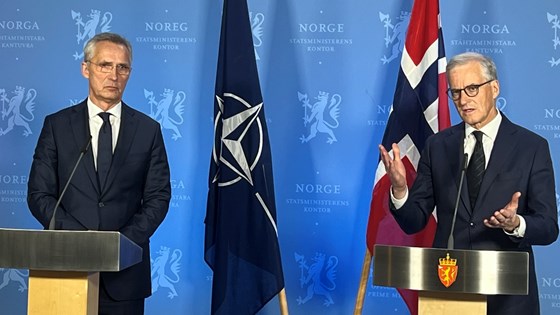Prime Minister of Norway Jonas Gahr Støre met with NATO Secretary General Jens Stoltenberg in Oslo on Tuesday. They discussed a range of issues including NATO’s relationship with Ukraine and ways in which Sweden, Finland and Norway can work together in NATO.
The informal meeting of NATO Ministers of Foreign Affairs is taking place in Oslo this week.
‘Membership of NATO has been a cornerstone of Norwegian security policy since the Alliance was established in 1949, and is of crucial importance now that there is war again in Europe. The security guarantee provided by NATO is essential to our security. At the same time, we all have a responsibility to contribute to our collective security. To this end, Norway has committed to increasing its defence spending to a minimum of 2 % of its GDP by 2026,’ said Prime Minister Jonas Gahr Støre.
Long-term support
Promoting long-term cooperation between NATO and Ukraine is an important aim.
‘Norway and other allies have supported Ukraine in its legitimate fight for independence and freedom from the outset. Military support from Norway and other Western countries is essential to the Ukrainian war effort, and we will support Ukraine for as long as is necessary. Under the Nansen Support Programme for Ukraine, Norway will provide military, humanitarian and civilian support totalling NOK 75 billion over a period of five years,’ said Mr Støre.
The Nordic region of NATO
The war in Ukraine is one of the reasons Finland has become a member of NATO, and Sweden’s accession has now been approved by almost all NATO countries.
‘We are seeing the contours of a new security map in the Nordic region. We look forward to Sweden becoming a full-fledged member of NATO too. Having all the Nordic countries in NATO will strengthen the collective defence capability of the Alliance in northern Europe. A united Nordic region in NATO will enable us to plan for the defence of our region in a way that has not been possible before. The Nordic chiefs of defence are currently considering how to optimise Nordic defence cooperation under a common NATO umbrella,’ said Mr Støre.
Security of energy supply
The war in Ukraine has also led to an energy shortage in Europe. Russia has severely disrupted energy supplies to Europe. Norway has responded by increasing gas deliveries to Europe, in part via subsea gas pipelines.
In December 2022, Prime Minister Støre and German Chancellor Olaf Scholz together proposed that NATO should establish a surveillance centre to improve the protection of critical subsea infrastructure.
‘I am pleased that NATO has followed up this initiative and has created an undersea infrastructure coordination cell to coordinate efforts to protect critical undersea energy and communications infrastructure. I look forward to further developments in this area, and NATO will be presenting a report on this before the summit in Vilnius. We are safer when we work together, and our Allies are now helping to protect our oil and gas installations. This in turn helps Norway to deliver gas securely to Europe,’ said Mr Støre.

